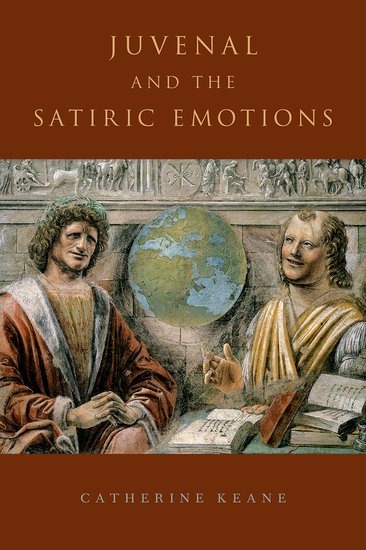https://classics.wustl.edu/xml/faculty_staff/11871/rss.xml
Professor Keane's research and teaching interests range broadly over Greek and Roman literature and culture, but center on the comic genres and their engagement with moral, social, and literary problems.
She has published books and articles on the Roman verse satirists Lucilius, Horace, Persius, and Juvenal and the Roman epigrammatist Martial. Her current major project is a commentary on Juvenal's fifth and last book of Satires.
Prior to joining the department in 2001, she taught at Reed College and Northwestern University. She has held research fellowships from the Mellon Foundation, the Loeb Classical Library Foundation, the Center for the Humanities at Washington University, and the Margo Tytus Visiting Scholars Program at the University of Cincinnati.
recent courses
Greek Mythology (CLASSICS 3010)
The myths of ancient Greece are not only inherently interesting, but they are an incomparable starting point for the study of the ancient world, and they have offered numerous images and paradigms to poets, artists, and theorists. This course provides an introduction to the major Greek myths, their role in literature and art, their historical and social background, and ancient and modern approaches to their interpretation. Student work will include discussing course material in sections and online, taking two exams covering both the myths themselves and the ancient authors who represent our richest sources, and writing several essays interpreting or comparing ancient literary treatments. Open to first-year students.
Horace (LATIN 4320/5321)
This course examines Roman poetry that illuminates ancient and still-influential ideas about the functions of literature. Horace's monumental Ars Poetica and his other literary-critical works will be the major texts. These works convey the complexity of contemporary debates about literature's role in society and history and about the merits of various genres (epic, tragedy, comedy, satire, epigram). Readings in secondary sources will help to fill out the picture of Horace's career and of the climate of literary production in early Imperial Rome.
Martial and Juvenal (LATIN 5800)
This course examines the Epigrams of Martial and the Satires of Juvenal in their context (Rome and the Roman world of the 80s-120s CE). Near- contemporaries and acquaintances, these two poets have had a massive impact on modern perceptions of the state of Rome under Domitian, Nerva, Trajan, and Hadrian. The world they represent is actually as much a poetic world full of dramas and fictions as it is a real place. From our readings the poets and from sources on their work and times, we will gain an understanding of their literary agendas. Topics of discussion and research will include imperial politics, the poetic career and literary tradition, Roman public spaces, amicitia and its rituals, private life, and sexual behavior. We will relentlessly practice accurate and clear Latin translation and scansion of the meters used by the epigrammatist and satirist, and every student will conduct and present original research.
Survey of Roman Literature II: The Empire (LATIN 5080)
An overview of the literature of the Roman imperial period, for graduate students. We will read substantial excerpts from major texts and authors beginning with the Augustan era and extending at least two centuries. By encountering a range of genres and styles, students will develop important reading strategies, cover a substantial amount of the graduate Latin Reading Lists, learn about the history and contexts of literary production in the empire, and become confident users of the relevant bibliography and research tools.
Selected Publications
Books
Juvenal and the Satiric Emotions (Oxford, 2015)
A Roman Verse Satire Reader (Bolchazy-Carducci, 2010)
Figuring Genre in Roman Satire (Oxford, 2006)
Recent and In-progress Articles and Chapters
"Vergilian Visions in Juvenalian Fictions"
"The Invention of Fiction in Juvenal Satire 15"
"Intertexts between Friends: The Rivalry of Martial and Juvenal"
"Conversations about Sermo," in Lucilius and Satire in Second-Century BC Rome, ed. B. Breed, E. Keitel, and R. Wallace (Cambridge, 2018)

Juvenal and the Satiric Emotions
By Catherine Keane
In his sixteen verse Satires, Juvenal explores the emotional provocations and pleasures associated with social criticism and mockery. He makes use of traditional generic elements such as the first-person speaker, moral diatribe, narrative, and literary allusion to create this new satiric preoccupation and theme. Juvenal defines the satirist figure as an emotional agent who dramatizes his own response to human vices and faults, and he in turn aims to engage other people's feelings. Over the course of his career, he adopts a series of rhetorical personae that represent a spectrum of satiric emotions, encouraging his audience to ponder satire's proper emotional mode and function. Juvenal first offers his signature indignatio with its associated pleasures and discomforts, then tries on subtler personae that suggest dry detachment, callous amusement, anxiety, and other affective states.
As Keane shows, the satiric emotions are not only found in the author's rhetorical performances, but they are also a major part of the human farrago that the Satires purport to treat. Juvenal's poems explore the dynamic operation of emotions in society, drawing on diverse ancient literary, rhetorical, and philosophical sources. Each poem uniquely engages with different texts and ideas to reveal the unsettling powers of its emotional mode. Keane also analyzes the "emotional plot" of each book of Satires and the structural logic of the entire series with its wide range of subjects and settings. From his famous angry tirades to his more puzzling later meditations, Juvenal demonstrates an enduring interest in the relationship between feelings and moral judgment.





